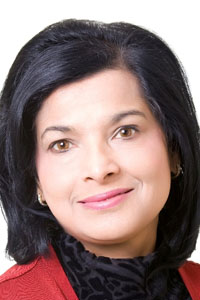05 February 2014
Leading the way on the future of economics
Colchester Campus

Professor Sheri Markose is organising the event
Essex is to host a special Economic and Social Research Council (ESRC) conference this month into new approaches to research in macroeconomics.
Co-hosted with the Department of Economics at Essex and organised by Professor Sheri Markose, the ESRC Conference on Diversity in Macroeconomics on 24-25 February will critically examine established thinking and bring together a range of new perspectives on identifying future directions for macroeconomics and policy.
The event is a follow-up to an ESRC event organised with the Oxford Martin School in 2012, which first raised the alarm regarding research in macroeconomics in the UK being unable to address the challenges posed by the 2007 economic crisis.
The conference will address developments from at least three new branches of economics: agent-based computational, complexity and behavioural economics. Sessions will cover various topics including behavioural macroeconomics, agent-based models for systemic risk and how to deal with uncertainty and complexity in policy. Leading economists, practitioners from central banks and institutions such as the IMF and OECD, along with famous neuro-scientists will be speaking and attending.
Essex has already been leading the way in ensuring economics is taught in a way which is relevant to today’s interconnected global economy. Professor Markose is well-known as a pioneer in the research and teaching of economics and finance using financial networks and agent-based models. The new MSc Computational Economics, Financial Markets and Policy course at Essex is the first of its kind in the country to teach the methodological innovations to be highlighted in this conference within an economics department.
Professor Markose, who will chair the conference, said: “Many students have been starved of new perspectives and new tool sets capable of dealing with a highly-digitally oriented and evolving world.
“The relative liberal ethos and emphasis on a multi-disciplinary approach at Essex enabled me to set-up radically new degrees since 2002. Others are now following suit, not least because of growing pressure from economics students.”
The growing feeling among students that current economics curricula lacks relevance to the big challenges facing today’s global economy was highlighted recently when economics undergraduates at the University of Manchester openly criticised University courses. A number of universities including Essex now have a chapter of the Post Crash Economics Society.
The conference will include a panel discussion on Why Do We Need Diversity in Macroeconomics? How to Increase Capacity in New Approaches, which is open to the public, on Monday 24 February in the Ivor Crewe Lecture Hall at the Colchester Campus from 6.10pm-7.40pm. Admission is free but you need to book a place.
Those interested in attending the whole Diversity in Macroeconomics conference will need to pay a registration fee.
Ends
Note to Editors
For more information please contact the University of Essex Communications Office on 01206 872400 or email comms@essex.ac.uk.
...more news releases